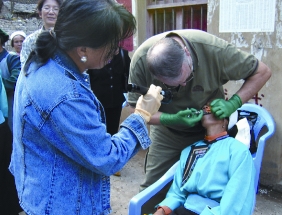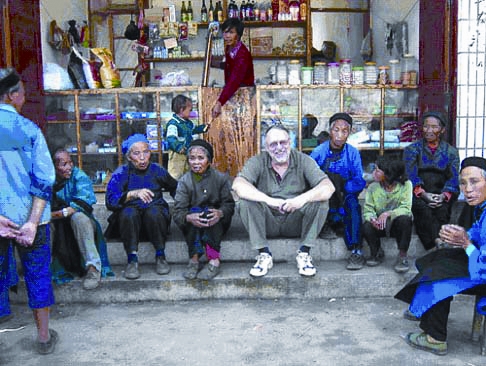In China With Aitece
By Dr Niels Peter Schmidt
Dr Schmidt, a dentist from Denmark, writes of his work in China with his Filipino wife, Babes C. Aguirre, who taught English in China as a member of the Association for International Teaching, Educational and Curriculum Exchange (AITECE, pronounced ‘EYE-tesh.’)
Recently, my wife, Babes C. Aguirre, and I, returned to Manila after one and a half years in China. Babes taught English as a second language in Guiyang Teachers’ College. She went as a member of AITECE.
Dr Schmidt at work, assisted by his wife, Babes
During Babes’ stay she also organized some voluntary health services for the ethnic minorities in that area, especially the Buyi and the Miao people. She persuaded me to provide dental care during visitsto Guiyang, in cooperation with the local health authorities. As a target we chose some remote villages outside the city of Zhenning and the local hospital inside the city, but here will focus on the Buyi people.
Dr Schmidt relaxing after work with his patients
The Buyi villages we visited are constructed like fortresses surrounded by a ring wall, because of the experience with local warlords and unrest a century ago. The only gate is locked at 9 every night. I was the first dentist ever to visit the villages and people didn’t know what to expect. So many showed up to be cured of blindness, back problems, headaches and so on . . . but we could only pull teeth!
Often the first patient was the barangay chief or political officer, and as he proudly finished his treatment, the line of waiting villagers would grow. Often patients came back, when they realized that the treatment was painless, and would ask for more teeth to be pulled while their mouth was still numb! During my work, the officer would sometimes play L’Internationale, the anthem of international communism and of the former Soviet Union, over the village loudspeakers.
Buyi women are easy to recognize by their dress, blue with a black apron. Most characteristic is the headscarf which covers the balder part of the forehead. The Buyi women pull the hair from the forehead saying that every hair pulled gives more happiness in life.
For me as the dentist, the main problem was to find a seat for the patient high enough so that I didn’t have to kneel during the treatment. Bu the people were so grateful, confident and happy, that it was very rewarding for me. Usually, to show their gratitude, they’d perform a traditional Buyi dance for me and my assistants and offer me sunflower seeds and cigarettes. But I don’t smoke, which was strange to them.
The hospital in the city was very simple: nothing but a spittoon, a slop-pail and a bare mattress on a bed in the ward. No facilities at all for treatment, no medicine. But this is the reality in poor rural areas of China. Western medicine is unaffordable for most hospitals, and traditional Chinese herbal drugs are the only medicine available.
Just outside the hospital was the market, where you find every kind of quackery for pulling teeth, with a complete lack of hygiene. It was funny to see four men cutting the hair of farmers. All looked alike, just like sheep having their annual shearing. Much of the hair lying on the ground had probably been there for months and was ‘alive.’ One good thing was that a haircut cost only P5 - but it showed!
We worked in different villages characterized by the difficulty of access, with no public transportation. It was obvious that villagers seldom visited the larger towns in the region. Life is divided between the village and the paddy fields. Living conditions are very tough and each day brings long hours of hard work with the hoe. China’s one child per family policy is suspended for the minorities as the leaders have realized that the poor need the cheap labor of their children for survival!
Volunteering as we did, opens the eyes to other cultures and widens the understanding of other people. This was not only our reward, but is also the basis for peace among people.

